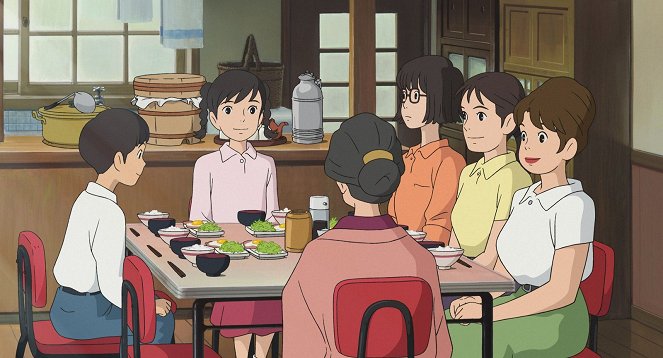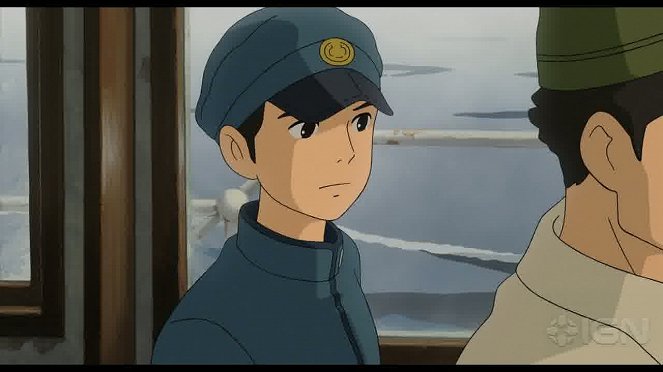Ohjaus:
Gorō MiyazakiKuvaus:
Atsushi OkuiSävellys:
武部聡志Näyttelijät:
岡田准一, 長澤まさみ, Jun Fubuki, Takashi Naitō, Teruyuki Kagawa, 大森南朋, Yuriko Ishida, Raymond Ochoa, 風間俊介, Rumi Hiragi, Keiko Takeshita, Haruka Shiraishi (lisää)Suoratoistopalvelut (2)
Juonikuvaukset(1)
Vuoden 1963 Yokohama herää eloon Studio Ghiblin haikeansuloisessa tarinassa Umi-tytöstä, joka merelle kadonnutta isäänsä kaivaten nostaa joka päivä merkkiliput salkoon: varoittamaan vaarasta, toivottamaan turvallista kotimatkaa. Yokohaman eteläsataman hinaajasta vastaa omilla merkkilipuillaan saman koulun poika, joka ihailee tyttöä etäältä. Tokion vuoden 1964 olympialaiset ovat tulossa. Koko Japani on muuttumassa. Kaikki tuntuu mahdolliselta. (Cinema Mondo)
(lisää)Videot (2)
Arvostelut (2)
Slow, non-confrontational and undramatic are adjectives that would normally be taken as negatives, but in the case of Goró Miyazaki’s second directorial effort, they are words of praise and descriptors of the signs of an exceptional work. In this hurried age, in the context of hyper-affected Japanese cinema and, in particular, in the context of the hysterical animated works created there, From Up on Poppy Hill is a unique gem. That is especially true when we consider that, in terms of genre, it is a romance and nostalgia film from the golden years of the 20th century and when we compare it with other such Japanese films of the past decade. Whereas the box-office smash Always – Sunset on Third Street and its sequels and imitators are characterised by an obsessive devotion to the details of the setting and minutely rendered recreations of the iconic buildings of the given period with the help of special effects and an almost propagandistic emphasis on traditional values personified by picturesque characters, Studio Ghibli’s project remains unobtrusive and takes the historical setting only as the rationalisation for the style of its narrative about youthful hopes. Viewers will only incidentally recognise that it involves a historical era from the elements in the second plane and the specific determination of the year in which it takes place comes only about halfway through the film in the form of posters for the upcoming Olympics. In the same manner, the romance in the film not only avoids the gender formulas that are otherwise glorified and hypertrophied in anime, but is completely devoid of any affectation and even artificial chastity. Conversely, the central couple’s relationship is wonderfully deep and dramatic, even without an overabundance of words. Like everything else in the film’s narrative, this relationship simply unfolds in subtle and very slowly developing demonstrations. If the director’s previous Tales from Earthsea was burdened by the immense excess of the plot and the vastness of the world and its mythology, then From Up on Poppy Hill is its exact antithesis – a story that would elsewhere serve for a single episode of a series is given all of the space it needs to calmly develop. The plot twists take the form of calmly stated and equably accepted messages and the dramatic development does not take the form of a steep sine curve, but rather resembles ripples on a calm sea. Using these methods, a retro film was created that absorbs the viewer with its captivating atmosphere of old carefree times without ever sliding into melancholy.
()
One of the most civil and story-driven of the most ordinary Studio Ghibli films is also one of the best. Goro Miyazaki puts an astonishing amount of detail into his father's script, and I completely understand why he lay low for nine long years after such meticulous labor. And as for traditional animation we expect from a studio with Totoro in their logo, this could very well have been his last contribution. If so, has he left behind a true treasure. Those subtle jokes, those painful memories of old age or, conversely, sincerely exposed emotions that only adolescence can bring – I got enough to last me through the next few films.
()
Kuvagalleria (36)
Kuva © Universum Film GmbH



Mainos